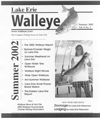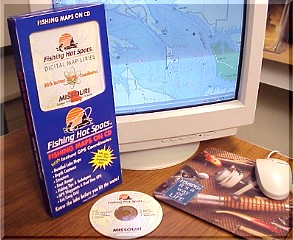In the
waters of Lake Erie and its Ohio tributary rivers and streams mainly east of
Cleveland, there is a fishing phenomenon occurring the likes of which
Buckeye anglers have never before experienced.
 Steelhead
trout-many weighing more than 10 pounds and measuring in excess of 30
inches-are being caught by the thousands, and the fishing looks to only get
better.
Steelhead
trout-many weighing more than 10 pounds and measuring in excess of 30
inches-are being caught by the thousands, and the fishing looks to only get
better.
Richard Popp from Mentor, Ohio, knows this fishery first- hand. A
steelhead fisherman for the past decade, he has landed and released
thousands of fish. But not quite all of his steelhead have made it back into
the water; a 14-pounder hangs on his office wall.
"I catch them in the take in the summer and in the rivers in the winter,"
Popp said. "I like to troll when I'm on Lake Erie. The fishing is so good
that we've had multiple steelhead on the lines at the same time." Popp went
on to say that steelhead hooked in the warmer waters of summer tend to
either jump or fight ferociously across the surface, earning them the nick-
name "silver bullets."
Steelhead are simply sea-run rainbow trout that have been transplanted to
the Great Lakes from their native Pacific Northwest. Stocked into tributary
streams as smolts (six to nine inches long), the young fish make their way
downstream to Lake Erie where they grow to maturity and take on the
steely-gray color that gives them their name. In the fall, they return to
the tributary river or stream where they were stocked to spawn. The fish
find their individual stream by smell and can detect homing scent clues up
to 30 miles away. Steelhead may stay in a stream all winter until the water
begins to warm in the spring and they return to the lake.
"Each spring we stock a total of nearly 400,000 Manistee- strain
steelhead in the Rocky River, Chagrin River, Grand River, and Conneaut
Creek," said Kevin Kayle, fisheries biologist for the ODNR Division of
Wildlife. "They grow rapidly, feeding primarily on emerald shiners, smelt,
alewives, and gizzard shad. These fish may live up to seven years and,
unlike salmon, don't die after spawning. They just keep eating and getting
bigger."
Kayle went on to say that steelhead average 2 to 3 pounds and 18 inches
after just one summer in Lake Erie, 6 to 7 pounds and 25 inches after two
years, and 8 to 10 pounds and 29 inches after three summers in the lake.
"The fishing that Ohio steelheaders are now experiencing is a combination of
good fishery science and years of just plain hard work," said Gary Isbell,
executive administrator for fish management with the Division of Wildlife.
"With the recent success of this program, we are looking at the possibility
of stocking even more Lake Erie tributary streams with steelhead in the
future.
Are you hooked yet? If you’re a serious Ohio angler and you’ve
never fought a Buckeye steelhead, you owe it to yourself to give it a try.
State Record Steelhead
Ohio’s state record steelhead trout was caught in Lake Erie on October 2,
1996, by Mike Shane of New Middletown, OH. It weighed 20.97 pounds and
measured 36.5 inches long!
Stream Etiquette
To ensure a quality fishing experience for everyone, fishing etiquette
should be kept in mind when fishing rivers or streams. For instance, if
someone is already fishing a particular stretch of river that you want to
fish, it is common courtesy to ask if they mind before you join them.
Another unwritten rule of the river is that once a fish is hooked all other
anglers fishing in that stretch should reel in their lines, giving the lucky
angler room to fight and land the steelhead. Anglers are reminded that it is
illegal to fish or trespass on private property without permission of the
landowner. Littering, including leaving items as small as spawn- bag
material and cigarette butts, is also illegal.
Steelhead Fishing Regulations
Anglers fishing the Ohio waters of Lake Erie and its tributaries are
reminded that steelhead must be at least 12 inches in length before they are
of legal size. The bag limit for steelhead and salmon is five, either singly
or in the aggregate, from May I through August 31. From September I through
April 30 no more than two steelhead or rainbow trout may be taken per angler
per day.
Free Fishing Publlications
Many public fishing areas are open to anglers on northeast Ohio rivers
and streams. For a list of these areas and more steelhead information,
contact a wildlife district office and ask for any or all of the following
free Division of Wildlife publications:
• Fishing Prospects - Northeast Ohio
• Trout Fishing in Lake Erie (Publication 34)
• Lake Erie Fishing Guide (Publication 276)
• Ohio Fish Identification Guide (Publication 334)






 Steelhead
trout-many weighing more than 10 pounds and measuring in excess of 30
inches-are being caught by the thousands, and the fishing looks to only get
better.
Steelhead
trout-many weighing more than 10 pounds and measuring in excess of 30
inches-are being caught by the thousands, and the fishing looks to only get
better.